
Parliament-Funkadelic is an American music collective of rotating musicians headed by George Clinton, primarily consisting of the funk bands Parliament and Funkadelic, both active since the 1960s. Their distinctive funk style drew on psychedelia, outlandish fashion, science-fiction, and surreal humor. They released albums such as Maggot Brain (1971), Mothership Connection (1975), and One Nation Under a Groove (1978) to critical praise, and scored charting hits with singles such as "Tear the Roof Off the Sucker" (1975) and "Flash Light" (1978). Overall, the collective achieved thirteen top ten hits in the American R&B music charts between 1967 and 1983, including six number one hits. Their work would have an influential effect on subsequent funk, post-punk, hip-hop, and techno artists of the 1980s and 1990s, while their collective mythology would help pioneer Afrofuturism.
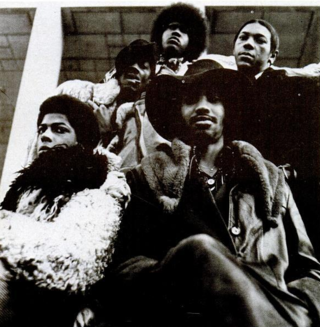
Funkadelic was an American funk rock band formed in Plainfield, New Jersey in 1968 and active until 1982. As one of the two flagship groups of George Clinton's P-Funk collective, they helped pioneer the funk music culture of the 1970s. Funkadelic initially formed as a backing band for Clinton's vocal group the Parliaments, but eventually pursued a heavier, psychedelic rock-oriented sound in their own recordings. They released acclaimed albums such as Maggot Brain (1971) and One Nation Under a Groove (1978).

Edward Earl Hazel was an American guitarist and singer in early funk music who played lead guitar with Parliament-Funkadelic. Hazel was a posthumous inductee to the Rock and Roll Hall of Fame, inducted in 1997 with fifteen other members of Parliament-Funkadelic. His ten-minute guitar solo in the Funkadelic song "Maggot Brain" is hailed as "one of the greatest solos of all time on any instrument". In 2015, Rolling Stone ranked Hazel at no. 83 in its list of the 100 Greatest Guitarists.

Maggot Brain is the third studio album by the American funk rock band Funkadelic, released by Westbound Records in July 1971. It was produced by bandleader George Clinton and recorded at United Sound Systems in Detroit during late 1970 and early 1971. The album was the final LP recorded by the original Funkadelic lineup; after its release, founding members Tawl Ross (guitar), Billy Nelson (bass), and Tiki Fulwood (drums) left the band for various reasons.
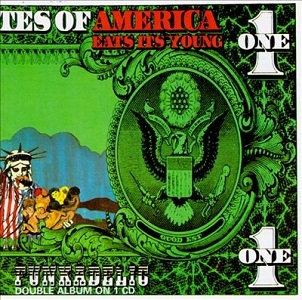
America Eats Its Young is the fourth album by Funkadelic, released in May 1972. This was the first album to include the whole of the House Guests, including Bootsy Collins, Catfish Collins, Chicken Gunnels, Rob McCollough and Kash Waddy. It also features the Plainfield-based band U.S., which consisted of guitarist Garry Shider and bassist Cordell Mosson, on most of the tracks. Unlike previous Funkadelic albums, America Eats Its Young was recorded in Toronto, Ontario, Canada, and in the UK. The original vinyl version contained a poster illustrated by Cathy Abel. The bottom of the poster features the first widespread appearance of the Funkadelic logo, which would appear on the cover of their next album Cosmic Slop.
William "Billy Bass" Nelson is an American musician, who was the original bassist for Funkadelic. He is a member of the Rock and Roll Hall of Fame, inducted in 1997 with fifteen other members of Parliament-Funkadelic.

Let's Take It to the Stage is the seventh album by American funk rock band Funkadelic. It was released in April 1975 on Westbound Records. The album charted at number 102 on the Billboard 200 and number 14 on the R&B Albums.

Hardcore Jollies is the ninth studio album by the funk rock band Funkadelic, released on October 29, 1976 by Warner Bros. Records, their first album to be issued on a major label. It is dedicated to "the guitar players of the world." Originally, the first side of the album was called "Osmosis Phase 1" and the second side was "Terribitus Phase 2." Hardcore Jollies was released one month after Funkadelic's final album for Westbound Records, Tales of Kidd Funkadelic, which was recorded during the same sessions.
Clarence Eugene "Fuzzy" Haskins was an American singer. He performed with 1950s and 1960s doo-wop group, The Parliaments, and was a founding member of the groundbreaking and influential 1970s funk bands Parliament and Funkadelic, also known as Parliament-Funkadelic. He left Parliament-Funkadelic in 1977 to pursue a solo career. He is a member of the Rock and Roll Hall of Fame, inducted in 1997 with fifteen other members of Parliament-Funkadelic. In 2019, he and Parliament-Funkadelic were given Grammy Lifetime Achievement Awards.

Tales of Kidd Funkadelic is the eighth studio album by the band Funkadelic, released in September 1976. It was their final album on the Westbound record label. The tracks were recorded during the same sessions as their first release for Warner Brothers Records, Hardcore Jollies; which was released a month later. Two tracks from Tales of Kidd Funkadelic, the single “Undisco Kidd” and the party anthem “Take Your Dead Ass Home!” have been staples in the band’s live performances since the album’s 1976 release, and can be heard on the 1977 Parliament concert album Live: P-Funk Earth Tour. The album opener “Butt-To-Buttresuscitation” and the song “I’m Never Gonna Tell It” were included in the band’s live shows during the early 2000s. The song "Let's Take It to the People" has been sampled by hip-hop band A Tribe Called Quest for their song "Everything Is Fair", on their album The Low End Theory.

Standing on the Verge of Getting It On is the sixth studio album by Funkadelic, released on Westbound Records, released in July 1974. It is notable for featuring the return of guitarist Eddie Hazel.
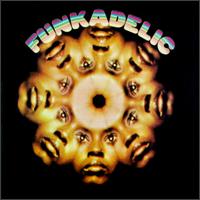
Funkadelic is the debut album by the American funk rock band Funkadelic, released in 1970 on Westbound Records.
Ramon "Tiki" Fulwood was an American musician. He was the drummer for the funk bands Parliament and Funkadelic, as well as a member of the Rock and Roll Hall of Fame, inducted in 1997 with fifteen other members of Parliament-Funkadelic.
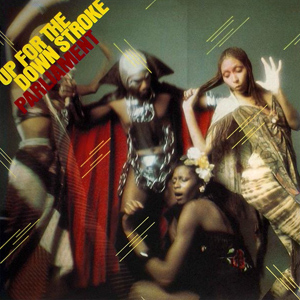
Up for the Down Stroke is an album by the American funk band Parliament. It was the band's second album, and their first to be released on Casablanca Records. The album was released on July 3, 1974. Its title track was Parliament's first chart hit and remains one of the most well-known P-Funk songs. The album also contains a funk reworking of The Parliaments' song "(I Wanna) Testify" under the title "Testify". The original title of the album was Whatever Makes Baby Feel Good, and the cover featured group leader George Clinton hovering over a woman in distress, sporting a black wig and monster-type gloves.

Osmium is the debut album of American funk band Parliament, led by George Clinton. The album has a psychedelic soul sound with a spirit of experimentation that is more similar to early Funkadelic than the later R&B-inspired Parliament albums. It was originally released in July 1970 on Invictus Records. The original vinyl release contained a glossy lyric sheet.
"Maggot Brain" is an instrumental by the American band Funkadelic, released on their 1971 album of the same name.

All The Woo In The World is the debut funk album by Parliament-Funkadelic keyboardist Bernie Worrell, released in 1978 by Arista Records. The album was produced by Bernie Worrell and P-Funk leader George Clinton and features various P-Funk alumni including Garry Shider, Bootsy Collins, Junie Morrison, Billy Bass Nelson, and Eddie Hazel.

Motor City Madness is a compilation album by the American funk rock band Funkadelic, released in 2003 by Westbound Records. It features a selection of songs previously released on the band's original albums for Westbound from 1970 to 1976. The compilation's 29 tracks span the length of two discs. Music critic Robert Christgau has said that, "for those with the heart for it, this is their most listenable album."
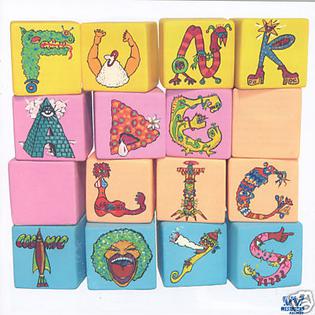
Toys is a compilation consisting of unreleased music by American funk rock band Funkadelic. It was released by Westbound Records in 2008 and consists of previously unreleased sessions recorded during the band's tenure for Westbound. The album was originally scheduled to be released in 2002, but was delayed numerous times, presumably due to legal issues. The CD also features a video clip of the song "Cosmic Slop", which can only be viewed on a PC.

The Best of the Early Years, Volume 1 is a compilation album by the American Funk band Funkadelic. It was released on Westbound in 1977 while the label was distributed by Atlantic Records. The Best of the Early Years, Volume One compiles material from Funkadelic's tenure at Westbound from 1969 to 1974.















